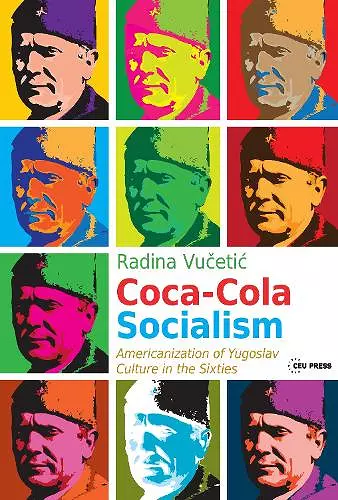Coca-Cola Socialism
Americanization of Yugoslav Culture in the Sixties
Radina Vucetic author John K Cox translator
Format:Hardback
Publisher:Central European University Press
Published:20th Jun '18
Currently unavailable, and unfortunately no date known when it will be back

This book is about the Americanization of Yugoslav culture and everyday life during the nineteen-sixties. After falling out with the Eastern bloc, Tito turned to the United States for support and inspiration. In the political sphere the distance between the two countries was carefully maintained, yet in the realms of culture and consumption the Yugoslav regime was definitely much more receptive to the American model. For Titoist Yugoslavia this tactic turned out to be beneficial, stabilising the regime internally and providing an image of openness in foreign policy.
Coca-Cola Socialism addresses the link between cultural diplomacy, culture, consumer society and politics. Its main argument is that both culture and everyday life modelled on the American way were a major source of legitimacy for the Yugoslav Communist Party, and a powerful weapon for both USA and Yugoslavia in the Cold War battle for hearts and minds.
Radina Vučetić explores how the Party used American culture in order to promote its own values and what life in this socialist and capitalist hybrid system looked like for ordinary people who lived in a country with communist ideology in a capitalist wrapping. Her book offers a careful reevaluation of the limits of appropriating the American dream and questions both an uncritical celebration of Yugoslavia’s openness and an exaggerated depiction of its authoritarianism.
"The red thread of Vučetić’s argument is the metaphor of the Roman god Janus’ double-face which she uses to describe Yugoslav positioning in-between the Blocs – looking at both sides, showing to each a different facet of itself, saying ‘no’ to both while never uttering an explicit ‘yes’. Consequently, the relatively unrestrained import of American cultural products to Yugoslavia proved to be a win-win situation for both regimes. Washington would happily watch the distance between Tito and other socialist leaders steadily increase, whereas Yugoslav communists would foster Yugoslav population’s sense of freedom and superiority over other socialist societies, but also strengthen the regime’s desired external image of ‘socialism with a human face’. This pattern was applied with contextual specificities in such diverse spheres of culture as film production, contemporary art, theatre, the jazz and rock music scenes, television and comics, eventually oxymoronically producing a decidedly Americanized socialist youth. Through its symbiosis of cultural, diplomatic and history of everyday life, this book provides a very important contribution not just to historiography of socialist Yugoslavia and Yugoslav-American relations, but more generally offers a welcome enrichment for the research on cultural diplomacy and Cold War Studies, further advancing the scholarly ‘thirding’ of Cold War dichotomies." * KULT_online *
ISBN: 9789633862001
Dimensions: unknown
Weight: unknown
362 pages